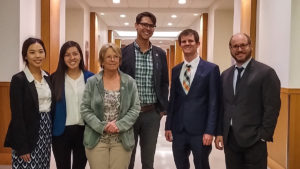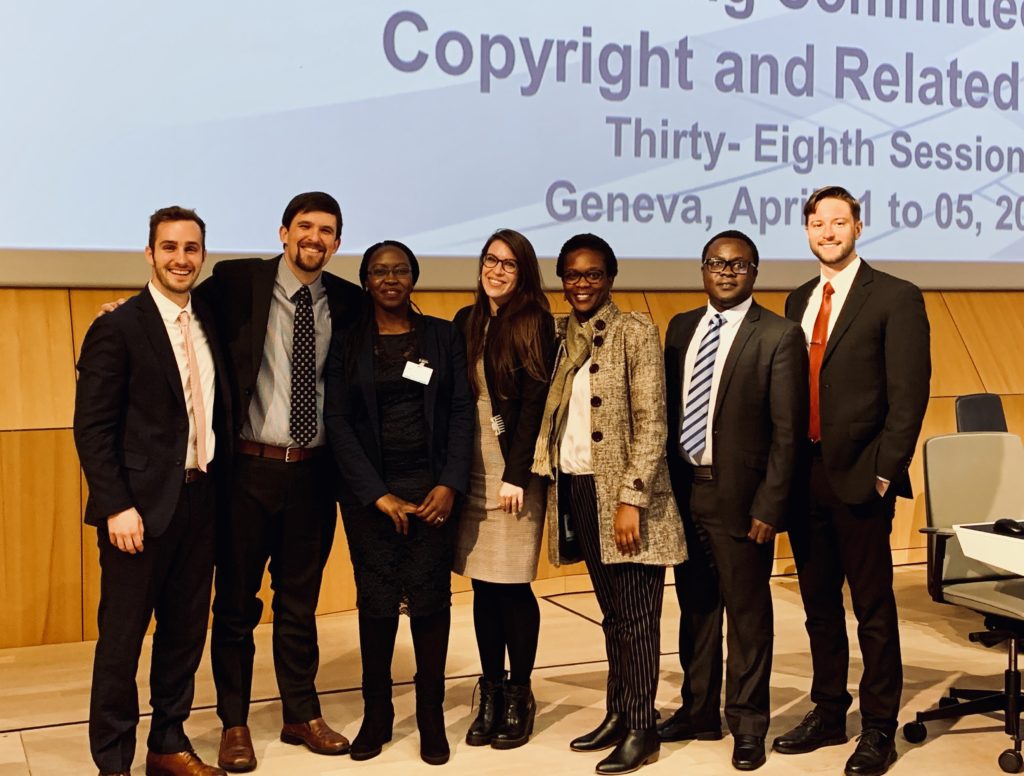The following is a guest post by Luke Ewing, student attorney at the Colorado Law Samuelson-Glushko Technology Law & Policy Clinic. We’d like to thank Luke and his classmates Sean Doran and Andi Wilt, and their supervisor Blake Reid, at Colorado Law; and law students Eric Malmgren, Erica Row, and Julia Wu, and their supervisor Jack Lerner, at UC Irvine Intellectual Property, Arts, and Technology Clinic for their assistance with the development of the Termination of Transfer tool and templates.

Erica Row, Julia Wu, Pamela Samuelson, Mike Wolfe, Eric Malmgren, and Jack Lerner (not pictured: Sean Doran, Luke Ewing, Andi Wilt, and Blake Reid)
Yesterday, Authors Alliance and Creative Commons released the Termination of Transfer tool at rightsback.org. You may be wondering what the tool does and how termination helps authors. Along with many other beta testers, student attorneys at the Colorado Law Samuelson-Glushko Technology Law & Policy Clinic and the UC-Irvine Intellectual Property, Arts, and Technology Clinichelped verify that the tool accurately reflects the state of termination law. We scoured statutes, regulations, and case history to determine what is required to make the termination process go smoothly under a wide range of circumstances. We also tested the tool to ensure that its results accurately reflect the current state of the law. Finally, we drafted a standardized form and written guidance that make the paperwork simple once an author decides to exercise their termination right.
Authors who assigned their copyrights many years ago may feel that their works are being underutilized or misrepresented, or they may want to renegotiate their earlier agreements. Fortunately, Congress devised a mechanism by which authors can take back those rights. This is a critical opportunity for authors who made less-than-advantageous deals early in their careers, saw their works become unavailable when a publisher went bankrupt, or want to release their works into the public domain or under an open access license. But because the window for termination opens decades after that original transfer of rights and requires navigating a particularly difficult and complex area of copyright law, exercising termination rights can be daunting.
Termination windows are determined by three separate subsections of the Copyright Act (§ 203, 304(c), and 304(d)), the format and instructions for notifying the Copyright Office are spelled out in a list of very particular regulations, and each subsection of the Copyright Act yields a different list of regulations. Determining whether the window is open for a copyrighted work, or which subsection applies, depends on a number of variables, including:
- Was it published?
- If so, when was it published?
- When were rights transferred?
- Did those rights include the right of publication?
- Has the agreement already been renegotiated?
- Were there multiple authors involved, and do they all agree to terminating the transfer?
- Are all the authors still alive?
- And more.
Every one of these questions is relevant, and every answer leads down different branches of a decision tree that indicates whether, when, and how an author may exercise termination rights rights. Without help, trying to understand these rights can be tedious and discouraging.
The tool makes understanding the process easy. It knows which questions to ask and what to do with the answers to those questions. Within minutes, the tool helps authors better understand how termination of transfer works. Congress intended for authors to exercise these rights, and Authors Alliance wants to simplify the process by removing as much confusion and uncertainty as possible. If you want to learn more about taking back the rights to your work, or are just curious about the process, you can try out the tool right now. It’s free, simple, and only takes a few minutes.
And if you decide to exercise your termination rights, check out our termination of transfer resource page for notice of termination templates, a cover letter, and instructions on how to notify the Copyright Office as well as any relevant parties.

